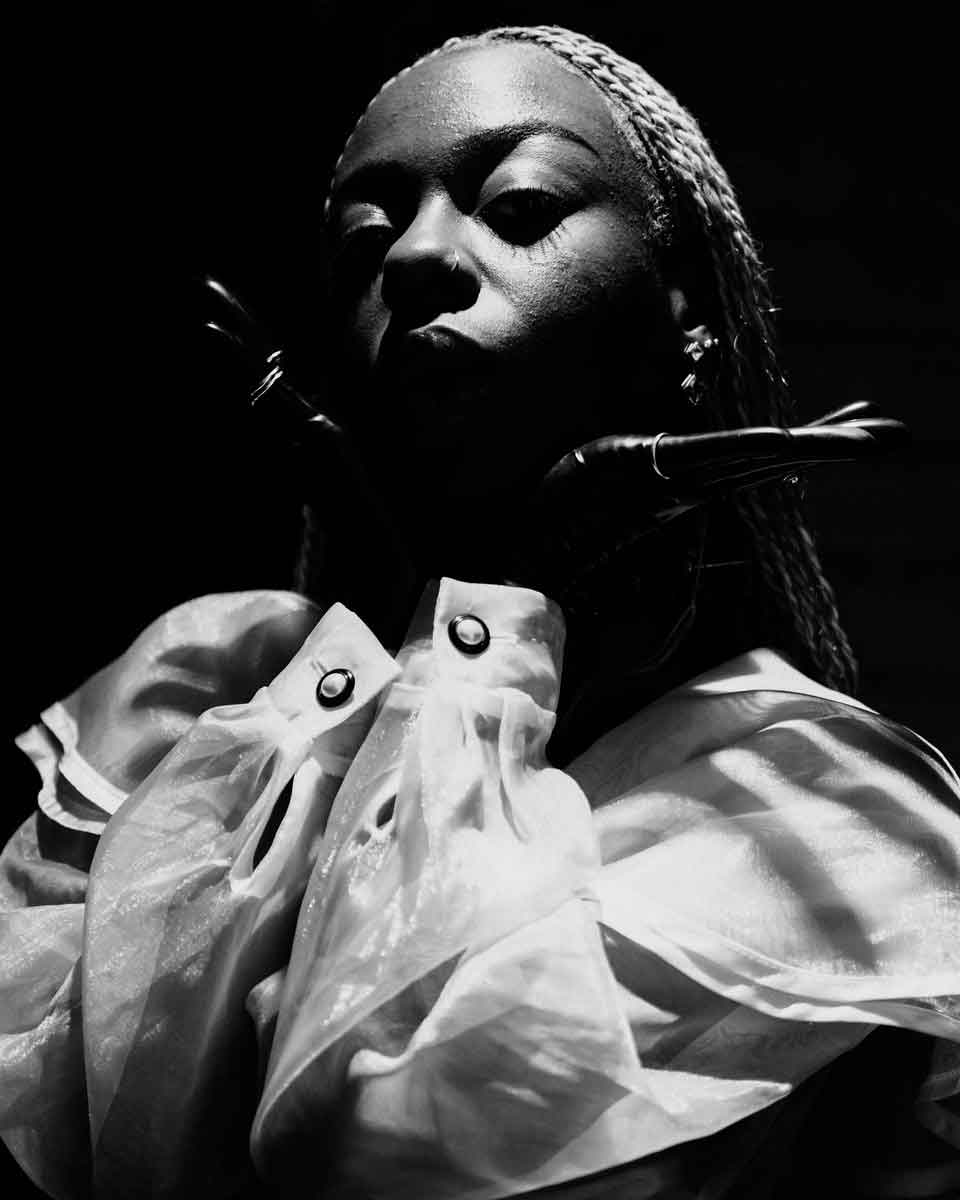For Debby Friday, the “punk” in her recent EP BITCHPUNK‘s title isn’t an aesthetic, or even just a musical genre. Instead, she tells me, it’s an energy of rebellion toward a purpose, “almost this…focused combustion.” It’s easy to hear that in her dark, heavy sound, which glows with fiery, tumultuous crescendos.
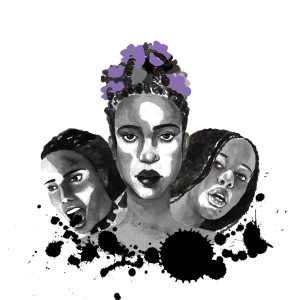
“There’s a lot of things that come out of turmoil,” Friday says. BITCHPUNK is clearly one of those things.
Friday speaks with me over the phone from Los Angeles, where she just did a show. She came a long way to get there, and not just in terms of geographic distance. Born in Nigeria, Friday to came Canada with her family when she was two years old. Now, in Vancouver, she is cultivating a strong following as musician and pursuing her MFA.
She never thought she would be here, she tells me. Even as she grew up in Canada and began her career as a DJ in Montreal’s party scene, Friday felt a sense of alienation, like she was an outsider in two worlds.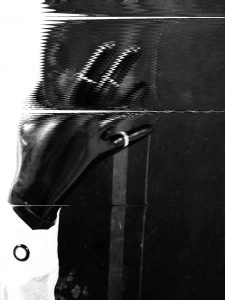 “I consider myself as very Canadian compared to other people I know who are born in their home countries. They’ve either not been here as long or are more immersed in diaspora communities. My family moved around a lot when I was growing up so I think that made it more difficult for me to keep any friends, point blank,” Friday shares, “when I was younger, it was more something that caused a lot of anxiety and loneliness.” She describes a cultural and intergenerational clash that made her feel just the kind of turmoil she sees as generative for art.
“I consider myself as very Canadian compared to other people I know who are born in their home countries. They’ve either not been here as long or are more immersed in diaspora communities. My family moved around a lot when I was growing up so I think that made it more difficult for me to keep any friends, point blank,” Friday shares, “when I was younger, it was more something that caused a lot of anxiety and loneliness.” She describes a cultural and intergenerational clash that made her feel just the kind of turmoil she sees as generative for art.
Leading up to BITCHPUNK, she felt a new turmoil in her life. Toward the end of 2016, she performed her first DJ gig at a friend’s invitation. She had been adrift after university with a degree in women’s studies and political science, yet with no desire to work in government or the non-profit sector. But after that first party, she dove into a suddenly explosive DJ career. “2017 was just like boom, boom, boom, and before I knew it, I went and did my first tour in Europe,” Friday shares.
But after that first European tour, her success started to hurt – mentally and physically. Friday was playing shows every wee
kend, and the constant partying was taking a toll on her body. She didn’t notice at first, because it was so normalized in the
scene. Eventually, she says, “I could feel my body was telling me, ‘No, I’m not doing this anymore.’”
The first six months after she got sober were hard. “I’ve struggled with substance abuse since I was a teenager and I knew quitting cold turkey was just the way it had to be. I knew I was using the partying and the drugs and alcohol as an excuse to not be present in my life and accountable to myself, my friends, family and my art.” Friday tells me. She had finally accepted that she truly wanted to be an artist, and needed to focus on her health to make that happen, so she chose sobriety.
Before Friday came to Vancouver, she spent some time living in her mom’s basement in Calgary, recovering from the physical and emotional trauma she had been experiencing. She put out her first song, “Danger,” shortly before leaving Montreal, and then began a multimedia project for Abstract Without Abstraction, a mixtape series out of Denver, Colorado. Though she was originally asked only to contribute a mix, the project soon grew to a three song project, produced and mixed by Friday, accompanied by video performance art and visual poetry. At the same time, Friday applied to art school, a long
held bucket list item. When she received an acceptance in Vancouver, she felt a call – she knew it was time to head west. Even as she moved, her career boom continued.
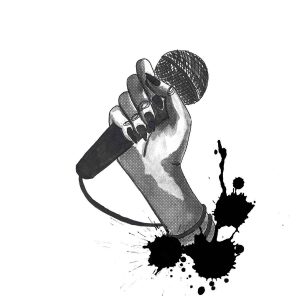
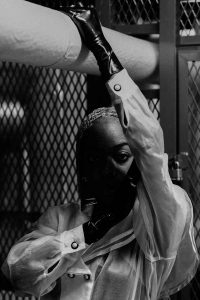
Friday describes her quick rise as “really lucky,” but it’s definitely not just luck. Her simult
aneous work on her MFA and her new music demonstrate her intense work ethic. Before she began producing her own music, Friday says, “I spent six months crawling YouTube and practicing. I would make songs everyday and really try to get my skills up, so I could be confident in what I was making.”
And she continues to bring that same drive to her music now, using her academic work to push the thought process behind her art. Friday recently wrote a paper on shouting as aesthetic practice, exploring new ideas of punk performance, gender and race and what it means for a black, immigrant woman to yell. Work like that helps her find new ways to defy musical boundaries.
Friday loves crossing boundaries. When she lists her influences, she doesn’t just note the electronic regulars. Instead, she goes heavier, broader, and more multidisciplinary. True to BITCHPUNK‘s title, she begins her list with punk rock, but she ranges wide from there. Her music, Friday says, grows from gospel, blues, heavy metal and industrial, as well as traditional Nigerian folk music. Most of all, it grows from pure self-expression.
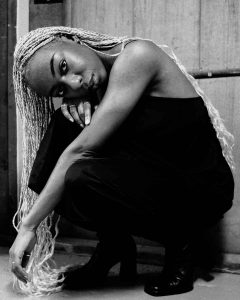
That’s the centre of art for Friday. Her work dives deep, and is heavily-rooted in herself and her lived experience. She eschews assumptions about what her subject matter should be or how her music should sound. Friday rejects the idea that a woman making punk music must only be angrily yelling at the patriarchy. She is angry, she says, but it’s a specific anger that’s targeted toward healing and metamorphosis. That’s what she wants to express.
BITCHPUNK is deeply, viscerally personal, but through self-expression, Friday says her music also becomes communication beyond the personal. She moves past spectatorship, instead engaging her audience in a moment of witnessing and share ritual, where she talks and they talk back. She’s found this communicative attitude especially helpful in her work on her upcoming second EP, which features multiple collaborations. Though she’s still figuring out how the process works for her, she tells me, “I’m very intuitive with how I live my life in general, so I bring that into the way I collaborate as well.” 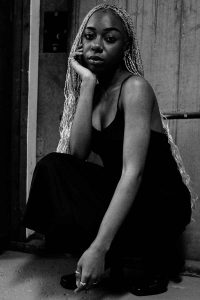
The new EP, set to come out by this summer, will present a more focused musical voice. She says it’s going to be “on an actual record label.” She’s not sure that the normative music industry model will work for her, but she’s approaching it just as intuitively as she does collaboration. If it doesn’t work, she’ll figure out something else that does. That’s how she feels about music in general. “I like making things and sharing them, so I’m just gonna have fun with it. The day that it stops being fun, I’ll just do something else.”
Friday’s musical rise has been so sudden it feels surreal to her. But even now, she maintains her intuitive attitude and prioritizes her own well-being. She wants to create music in a way that resonates with her individually, not in the way that other people have done it.
So far, she’s accomplishing exactly that, with heart-pounding, daringly new music to match.


